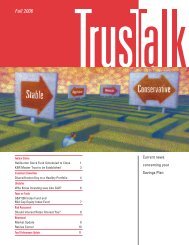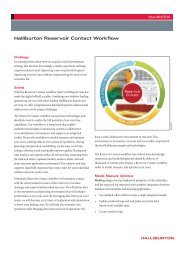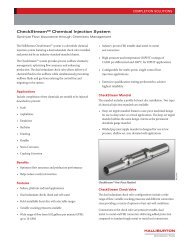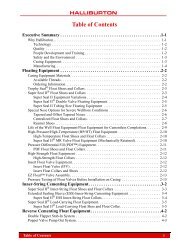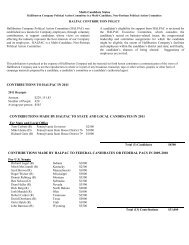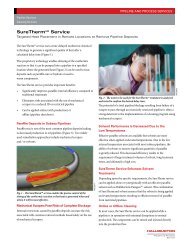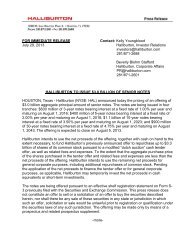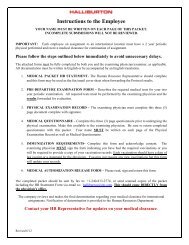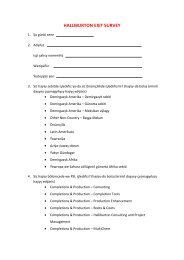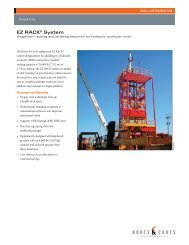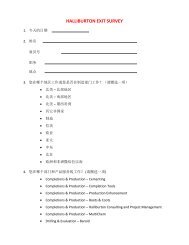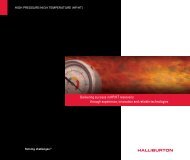COBC - Code of Business Conduct - Halliburton
COBC - Code of Business Conduct - Halliburton
COBC - Code of Business Conduct - Halliburton
You also want an ePaper? Increase the reach of your titles
YUMPU automatically turns print PDFs into web optimized ePapers that Google loves.
<strong>Code</strong> <strong>of</strong> <strong>Business</strong> <strong>Conduct</strong>
Message from the President<br />
Dear Colleagues,<br />
For nearly a century, <strong>Halliburton</strong> employees have worked tirelessly to deliver<br />
outstanding products, services and solutions to our customers. This hard work has<br />
yielded consistent, long-term success. We continue to gain new customers and to<br />
also expand relationships with existing customers. We are developing some <strong>of</strong> the<br />
industry’s most advanced technological solutions. In all corners <strong>of</strong> the world and in<br />
every corner <strong>of</strong> the Company, we have repeatedly and resoundingly prevailed over<br />
our competition. I appreciate and applaud those efforts, and I am proud <strong>of</strong><br />
our accomplishments.<br />
David Lesar<br />
Chairman <strong>of</strong> the Board, President<br />
and Chief Executive Officer<br />
My deepest pride, however, comes from the way we achieve our goals. We succeed<br />
with uncompromising integrity. When we face difficult decisions during the course<br />
<strong>of</strong> our work, we choose the ethical course <strong>of</strong> action. Honesty, fairness and respect<br />
are not sacrificed in pursuit <strong>of</strong> pr<strong>of</strong>its.<br />
The <strong>Halliburton</strong> Board <strong>of</strong> Directors and the senior management team are<br />
committed to our Company’s core values, and we expect that same commitment<br />
from every employee. Ethical behavior; technology innovation; health, safety and<br />
environmental leadership; service quality – these values have defined <strong>Halliburton</strong><br />
since the founding <strong>of</strong> the Company. If we realize our vision <strong>of</strong> being the preferred<br />
upstream service company for the development <strong>of</strong> global oil and gas assets, we must<br />
remain faithful to these essential ideals.<br />
To ensure that we all understand the requirements set forth in the <strong>Code</strong> <strong>of</strong> <strong>Business</strong><br />
<strong>Conduct</strong> and can commit to it with complete confidence, we have updated its look<br />
and language. It clearly outlines the guiding principles that can help us make the<br />
right decisions when confronted with challenging circumstances. Please read it<br />
carefully and refer back to it as needed.<br />
We are all accountable for upholding and abiding by the <strong>Code</strong> <strong>of</strong> <strong>Business</strong> <strong>Conduct</strong>.<br />
It applies equally to all employees, directors and <strong>of</strong>ficers <strong>of</strong> the Company, and to all<br />
third parties that conduct business on behalf <strong>of</strong> <strong>Halliburton</strong>. If you see or suspect<br />
that unethical behavior has occurred, you are obligated to come forward with your<br />
concerns. Contact your supervisor. Call the Ethics Helpline. Above all, do not<br />
abandon your responsibility because <strong>of</strong> fear. We will not tolerate retaliation against<br />
anyone who raises issues in good faith.<br />
Ours is the best global team in the industry. Take pride in the accomplishments<br />
and the stature <strong>of</strong> our Company. In every decision you face, make integrity your<br />
highest priority, and demand the same from those around you.<br />
Thank you for doing what it takes to maintain the <strong>Halliburton</strong> legacy <strong>of</strong> success<br />
and integrity.<br />
1
Table <strong>of</strong> Contents<br />
Purpose.............................................................................................................................................................5<br />
Introduction.................................................................................................................................................... 6<br />
Reporting and Investigation........................................................................................................................... 9<br />
Relationship with the Company<br />
Employment and the Workplace..........................14<br />
Health, Safety and<br />
Environment (HSE)................................................18<br />
Conflicts <strong>of</strong> Interest............................................... 20<br />
Use and Public Disclosure <strong>of</strong><br />
Material Nonpublic Information......................... 22<br />
Financial Integrity, Reporting<br />
and Disclosure.........................................................23<br />
Protection <strong>of</strong> Company Assets............................. 26<br />
Privacy and Data Security.................................... 30<br />
Relationship with Others<br />
Anti-Bribery and<br />
Anti-Corruption.................................................... 34<br />
Gifts, Entertainment<br />
and Hospitality........................................................38<br />
Fair Competition.................................................... 42<br />
International Trade................................................44<br />
Communications with the Public,<br />
Investors and the Media........................................46<br />
Civic and Charitable Activities............................ 48<br />
Political Activities and Lobbying........................ 48<br />
<strong>Conduct</strong>ing <strong>Business</strong> with the<br />
U.S. Government.................................................... 49<br />
U.S. Federal Sentencing Guidelines.................... 49<br />
Conclusion...................................................................................................................................................... 51<br />
Compliance and Ethics Resources at <strong>Halliburton</strong> ....................................................................................... 53<br />
Waivers........................................................................................................................................................... 53<br />
3
The <strong>Code</strong> <strong>of</strong> <strong>Business</strong> <strong>Conduct</strong> is the ultimate<br />
resource document. It communicates to the<br />
world our culture, our values and our rules.<br />
Without standards in place, ethical conduct<br />
becomes a vague concept. The <strong>Code</strong> provides<br />
a baseline standard for all employees, <strong>of</strong>ficers,<br />
contractors and suppliers, so that everyone<br />
who is connected with <strong>Halliburton</strong> knows<br />
what is expected.<br />
Sherry Williams<br />
Senior Vice President and<br />
Chief Ethics and Compliance Officer<br />
4
The Purpose <strong>of</strong> the<br />
<strong>Code</strong> <strong>of</strong> <strong>Business</strong> <strong>Conduct</strong><br />
At <strong>Halliburton</strong> we are committed to conducting<br />
business with the highest levels <strong>of</strong> integrity, in full<br />
compliance with both the letter and spirit <strong>of</strong> the law.<br />
As part <strong>of</strong> this commitment, we must do the right<br />
thing and make the right choices as we undertake<br />
our daily activities. This includes helping to foster an<br />
environment where we treat each other respectfully,<br />
deliver world-class service to our clients, compete<br />
honestly, and take pride in our Company.<br />
It is not always easy to identify the right course <strong>of</strong><br />
action. In situations where additional direction is<br />
required, this <strong>Code</strong> <strong>of</strong> <strong>Business</strong> <strong>Conduct</strong> (the “<strong>Code</strong>”)<br />
serves as a practical guide to help you make the right<br />
legal and ethical choices. Together with the policies<br />
and business practices referenced here, the <strong>Code</strong><br />
is the foundation <strong>of</strong> <strong>Halliburton</strong>’s core value <strong>of</strong><br />
Ethical Behavior and our global ethics and<br />
compliance practices.<br />
The <strong>Code</strong> highlights the important legal, ethical and<br />
regulatory requirements that govern <strong>Halliburton</strong>’s<br />
global operations. It also provides resources for<br />
additional information and guidance on how<br />
to report potential violations. You must read,<br />
understand and abide by the <strong>Code</strong>. We expect your<br />
wholehearted support <strong>of</strong> the values and principles<br />
it contains.<br />
Our Commitment to Honest, Fair Dealing<br />
The <strong>Halliburton</strong> Board <strong>of</strong> Directors has adopted<br />
this <strong>Code</strong> to ensure honest and ethical conduct;<br />
compliance with applicable laws and regulations;<br />
and fairness with customers, suppliers, competitors<br />
and employees. We value good citizenship and do<br />
not take advantage <strong>of</strong> others through manipulation,<br />
concealment, abuse <strong>of</strong> privileged information,<br />
misrepresentation <strong>of</strong> material facts, or any other<br />
unfair practices.<br />
Compliance with the Law<br />
It is our policy that all <strong>of</strong> our directors, employees<br />
and anyone acting on our behalf comply with all<br />
applicable laws in each place where we do business.<br />
We are a U.S. company and, in some situations,<br />
the applicable law <strong>of</strong> the U.S. may conflict with the<br />
applicable law <strong>of</strong> another country. In such cases we<br />
will follow the guidance <strong>of</strong> the Ethics & Compliance<br />
Practice Group in the Law Department to resolve<br />
the conflict.<br />
The <strong>Code</strong> applies wherever we do business, equally<br />
to all <strong>Halliburton</strong> directors and employees, including<br />
<strong>of</strong>ficers, as well as employees <strong>of</strong> <strong>Halliburton</strong>’s<br />
subsidiaries and affiliates. We also expect all<br />
suppliers, contract employees, agents, consultants and<br />
others acting on our behalf to abide by the principles<br />
in the <strong>Code</strong>.<br />
5
Introduction<br />
Using the <strong>Code</strong><br />
The <strong>Code</strong> provides a framework to help guide<br />
your behavior. It does not address every situation<br />
you may encounter but is meant to supplement<br />
your own good judgment, common sense and<br />
knowledge <strong>of</strong> what’s right. As such, any conduct<br />
that is unethical or illegal could subject you to<br />
appropriate discipline, even if it is not specifically<br />
mentioned in the <strong>Code</strong>.<br />
You should reference the <strong>Code</strong> whenever you have<br />
a question or concern about compliance-related<br />
issues or what constitutes ethical and lawful<br />
conduct. Note that each section <strong>of</strong> the <strong>Code</strong> also<br />
contains references to <strong>Halliburton</strong> policies and<br />
business practices that provide additional detail on<br />
specific topics.<br />
If you ever have any questions about the <strong>Code</strong><br />
or about how to handle a specific situation, you<br />
should speak with your supervisor, contact one<br />
<strong>of</strong> the available Ethics & Compliance resources,<br />
or read the <strong>Halliburton</strong> policy or business practice<br />
that relates to the subject <strong>of</strong> your question. The<br />
Chief Ethics & Compliance Officer (CECO) and<br />
the entire Ethics & Compliance Practice Group in<br />
the Law Department are always available to answer<br />
your questions or discuss any potential <strong>Code</strong><br />
violations that you would like to bring to their<br />
attention. Please do not hesitate to contact them<br />
in person, by phone or through email anytime.<br />
Our Responsibilities<br />
Your Responsibilities as an Employee<br />
• Understand and comply with <strong>Halliburton</strong>’s <strong>Code</strong>,<br />
policies and business practices.<br />
• Comply with all applicable laws and regulations.<br />
• Seek guidance whenever you have questions.<br />
• Promptly report any suspected violations to your<br />
supervisor or one <strong>of</strong> the Ethics & Compliance resources.<br />
• Take responsibility for your own conduct and take pride<br />
in your actions.<br />
6
Take Note!<br />
Before determining a course <strong>of</strong> action where the<br />
right choice may not be clear, always ask yourself:<br />
• Is it legal?<br />
• Is it permitted by the <strong>Halliburton</strong> <strong>Code</strong>,<br />
policies and business practices?<br />
• Is it the right thing to do?<br />
• Would I be proud to have friends and family<br />
know about my choice?<br />
If you are still unsure or have additional<br />
concerns, you should get assistance from<br />
your supervisor, Human Resources or the<br />
Ethics & Compliance Practice Group in the<br />
Law Department before acting.<br />
Your Responsibilities as a Supervisor<br />
• Be a positive role model.<br />
• Ensure that your employees understand and comply with<br />
<strong>Halliburton</strong>’s <strong>Code</strong>, policies and business practices.<br />
• Ensure that your employees comply with all applicable<br />
laws and regulations.<br />
• Emphasize the importance <strong>of</strong> the <strong>Code</strong> and reinforce<br />
<strong>Halliburton</strong>’s commitment to conducting business legally<br />
and ethically.<br />
• Encourage open communication with employees and<br />
provide guidance and feedback in response to their<br />
questions and concerns.<br />
• Understand when to escalate issues, report violations,<br />
and get assistance from available resources.<br />
• Ensure that <strong>Halliburton</strong>’s zero-tolerance position<br />
on retaliation against good-faith reporters is<br />
strictly enforced.<br />
7
The <strong>Code</strong> <strong>of</strong> <strong>Business</strong> <strong>Conduct</strong> is<br />
important to me as an employee <strong>of</strong><br />
<strong>Halliburton</strong> because it helps ensure<br />
that I have a safe work environment,<br />
which allows me to focus on the work<br />
at hand.<br />
Nikki Weatherly<br />
Fixed-Cutter Drill Bit Fabricator<br />
8
Reporting and Investigation<br />
Asking Questions and Reporting Violations<br />
We all have a duty to help the Company uncover and<br />
address illegal activities and promote appropriate<br />
action on ethical issues. If you become aware <strong>of</strong><br />
behavior that violates, or appears to violate, this<br />
<strong>Code</strong>, <strong>Halliburton</strong> policies or business practices,<br />
or applicable laws and regulations, you have a<br />
responsibility under the <strong>Code</strong> to report the<br />
behavior promptly.<br />
There are a number <strong>of</strong> ways to report issues or ask<br />
questions. No matter which avenue you select, your<br />
issue will be treated with the same high level <strong>of</strong><br />
seriousness and importance. The <strong>Code</strong> contains<br />
contact information for Ethics & Compliance<br />
reporting, including the toll-free numbers for our<br />
Ethics Helpline.<br />
Where the law allows, you may report violations<br />
anonymously through our Ethics Helpline or via<br />
email. Please understand, however, that it may be<br />
difficult or impossible for <strong>Halliburton</strong> to thoroughly<br />
investigate reports that are made anonymously.<br />
Therefore, we encourage you to consider sharing<br />
your identity to enable follow-up and improve our<br />
fact-gathering ability. If you do decide to remain<br />
anonymous, please provide as much information in<br />
your report as possible.<br />
Reference<br />
Company Policy 3-02120, “Administration <strong>of</strong> the <strong>Code</strong> <strong>of</strong> <strong>Business</strong> <strong>Conduct</strong>”<br />
Take Note!<br />
Even after reading the <strong>Code</strong> and related policies,<br />
you may still have questions about how to<br />
proceed, or whether you should report certain<br />
behavior. Do not hesitate to request advice<br />
from the many valuable Ethics & Compliance<br />
resources at <strong>Halliburton</strong> that are available to<br />
help you.<br />
In most situations, start by speaking with your<br />
supervisor. If your supervisor is unable to<br />
provide answers to your questions, or if you are<br />
not comfortable speaking with him or her about<br />
the issue, reach out to a different Ethics &<br />
Compliance resource.<br />
These include:<br />
• The Ethics & Compliance Practice Group<br />
in the Law Department<br />
• Your Local Ethics Officer<br />
• Human Resources<br />
• The Ethics Helpline<br />
9
Reporting and Investigation<br />
Our Commitment to Non-Retaliation<br />
We will not tolerate any type <strong>of</strong> retaliation against<br />
an employee for making a report or participating in<br />
an investigation in good faith. Such actions may also<br />
be protected in accordance with the Sarbanes-Oxley<br />
Act <strong>of</strong> 2002 and the Dodd-Frank Wall Street Reform<br />
Act and Consumer Protection Act. Acting in “good<br />
faith” means that you reasonably believe a violation<br />
has occurred (or will occur), that you disclose all <strong>of</strong><br />
the information you have, and that you believe you<br />
are giving a complete and accurate report. Anyone<br />
who retaliates against a good-faith reporter will be<br />
subject to disciplinary action, up to and including<br />
termination <strong>of</strong> employment. You should never file<br />
reports that are knowingly false or made in bad faith.<br />
A bad-faith report can result in disciplinary action,<br />
up to and including termination.<br />
Investigations and Confidentiality<br />
We will respond to all reports as promptly as possible.<br />
We will treat reported information in a confidential<br />
manner to the fullest extent practical while still<br />
enabling a thorough investigation.<br />
The appropriate individuals within the Company<br />
will be assigned to promptly investigate all reports.<br />
In certain circumstances outside investigators and<br />
legal counsel may also be involved. As an employee<br />
you are expected to cooperate fully with all internal<br />
and external investigations or audits. This includes<br />
responding to investigations truthfully and disclosing<br />
all relevant information that you have.<br />
Consequences <strong>of</strong> Violating the <strong>Code</strong><br />
At <strong>Halliburton</strong>, Ethical Behavior is a core value and we take <strong>Code</strong> violations very seriously. Failure to follow<br />
the <strong>Code</strong> could result in disciplinary action, up to and including termination <strong>of</strong> employment and legal action<br />
in some cases.<br />
Take Note!<br />
Retaliation is defined as any adverse action taken against an employee because he or she exercised<br />
his or her protected rights. A few examples are:<br />
• Creating an uncomfortable or hostile<br />
work environment<br />
• Decreasing or marginalizing<br />
responsibilities or reporting relationships<br />
• Transferring an employee<br />
• Denying or excluding the employee from<br />
training and development opportunities<br />
10
What can I expect after I make a report in<br />
good faith?<br />
After making a report to any <strong>Halliburton</strong> Ethics &<br />
Compliance resource, you can expect the following:<br />
• Your report will be taken seriously.<br />
• Your report will be investigated promptly and<br />
thoroughly.<br />
• Your report and your identity will be treated<br />
confidentially to the extent practical or to the<br />
extent permissible by law.<br />
• Your report will be escalated appropriately,<br />
including to the <strong>Halliburton</strong> Board <strong>of</strong><br />
Directors.<br />
• If you have disclosed your identity, you will<br />
receive follow-up communications regarding<br />
the receipt and final closure <strong>of</strong> your report.<br />
• You will not be subject to any retaliation as a<br />
result <strong>of</strong> your good-faith report.<br />
I believe that I may have witnessed a violation<br />
<strong>of</strong> the <strong>Code</strong>, but I am not sure. What should I do?<br />
If you reasonably suspect a violation <strong>of</strong> the <strong>Code</strong>,<br />
you must report it. The earlier the issue is reported,<br />
the sooner it can be resolved. Even if you don’t have<br />
all the facts, you should discuss what you know <strong>of</strong><br />
the suspected violation with your supervisor, report<br />
the issue to the Ethics & Compliance Practice<br />
Group in the Law Department, or call the Ethics<br />
Helpline. By doing so, you will have fulfilled your<br />
obligation under the <strong>Code</strong> and will help ensure that<br />
we can carefully review the issue to determine if a<br />
violation has occurred.<br />
Company policy prohibits retaliation against<br />
anyone who reports a concern in good faith.<br />
Acting in “good faith” means that you reasonably<br />
believe a violation has occurred (or will occur),<br />
that you disclose all <strong>of</strong> the information you have,<br />
and that you believe you are giving a complete and<br />
accurate report.<br />
11
The <strong>Code</strong> shows me that <strong>Halliburton</strong><br />
has high standards and expectations<br />
for all employees, and that the<br />
Company believes we should all be<br />
treated equally and fairly. I also know<br />
that, if something comes up, there is<br />
somewhere I can turn to for help.<br />
Kendrick Mosby<br />
Senior Drill Bit Fabricator<br />
12
Relationship with the Company<br />
The <strong>Halliburton</strong> community is made up <strong>of</strong><br />
approximately 72,000 employees, representing<br />
140 nationalities in approximately 80 countries.<br />
Ensuring that those employees work in the safest<br />
conditions possible, are treated with fairness and<br />
dignity, and operate in an environment <strong>of</strong> integrity<br />
is a priority. It’s necessary to the well-being <strong>of</strong> the<br />
Company, and, more importantly, it’s necessary to<br />
the well-being <strong>of</strong> every employee.<br />
Creating and maintaining such an environment is<br />
not up to any single person, or group, within the<br />
Company. It requires the support and commitment<br />
<strong>of</strong> every member <strong>of</strong> our team. From the chemist<br />
in India, to the engineer in Angola, the secretary<br />
in Canada, and the <strong>Business</strong> Development<br />
manager in Brazil – we all play a role in creating<br />
such an environment.<br />
This commitment is outlined in the “Relationship with the Company” section <strong>of</strong> <strong>Halliburton</strong>’s <strong>Code</strong> <strong>of</strong><br />
<strong>Business</strong> <strong>Conduct</strong>, which discusses the Company’s policies and guidelines related to:<br />
• Employment and the Workplace<br />
• Health, Safety and Environment (HSE)<br />
• Conflicts <strong>of</strong> Interest<br />
• Financial Integrity, Reporting and Disclosure<br />
• Protection <strong>of</strong> Company Assets<br />
• Privacy and Data Security<br />
• Use and Public Disclosure <strong>of</strong> Material<br />
Nonpublic Information<br />
These policies serve as a guide. It is the responsibility <strong>of</strong> every employee to make a commitment to<br />
<strong>Halliburton</strong>, and to one another, to work with honesty, integrity, fairness and safety.<br />
13
Employment and the Workplace<br />
We Prohibit Harassment<br />
At <strong>Halliburton</strong>, we treat everyone – whether they are our fellow<br />
employees, customers, suppliers or other business partners<br />
– with respect and dignity. Everyone deserves to work in an<br />
environment where they feel welcome and secure. That is why<br />
we try to foster an environment that is free from harassment<br />
and disrespectful behavior.<br />
Our Company will not tolerate any form <strong>of</strong> harassment or<br />
behavior that creates an intimidating, hostile or <strong>of</strong>fensive<br />
work environment for another person. A few examples <strong>of</strong><br />
harassment include:<br />
• Sexual, in the form <strong>of</strong> unwelcome physical contact<br />
or gestures<br />
• Inappropriate comments and jokes<br />
• Offensive or explicit images<br />
• Racial or ethnic slurs<br />
• Bullying or intimidation<br />
If you feel that you have been harassed, or have witnessed<br />
harassing behavior, first you should speak with the <strong>of</strong>fending<br />
party. If that does not resolve the issue, then you should report it<br />
immediately to your supervisor, Human Resources, the Ethics &<br />
Compliance Practice Group, or the Ethics Helpline. Please keep<br />
in mind that it is not harassment or retaliation for a manager or<br />
supervisor to enforce job performance. We will not tolerate any<br />
type <strong>of</strong> retaliation against an employee for making a report or<br />
participating in an investigation in good faith.<br />
One <strong>of</strong> my supervisors has asked me<br />
several times to meet for drinks after<br />
work. I have repeatedly told him that I am<br />
not available in the evenings, but he keeps<br />
asking. Last week he mentioned that if I<br />
joined him for drinks, it might go a long<br />
way in getting me the raise I have been<br />
promised. It doesn’t seem right that I have<br />
to go out for drinks with him to get the<br />
raise that I deserve. Am I overreacting?<br />
No, you are not overreacting. If<br />
your supervisor is making you feel<br />
uncomfortable and implying that your<br />
refusal to comply with his request can<br />
impact your potential for a raise, that is<br />
not okay. Similarly, threatening to fire,<br />
demote or transfer a person if he or she<br />
objects to certain conduct are examples<br />
<strong>of</strong> harassment. You should report this<br />
behavior to one <strong>of</strong> your compliance<br />
resources immediately. Remember that the<br />
Company strictly prohibits retaliation for<br />
claims made in good faith.<br />
14
We Encourage an Inclusive Workplace<br />
We value a workforce comprised <strong>of</strong> individuals with diverse<br />
skills, perspectives and backgrounds. We make all employment<br />
and promotion decisions based upon an individual’s merits,<br />
qualifications and performance. No decisions are based on<br />
discriminatory factors such as race, color, religion, gender,<br />
sexual preference/orientation, citizenship, marital status,<br />
veteran status, genetic information, national origin, age or<br />
disability, or any other status protected by law or regulation.<br />
<strong>Halliburton</strong> abides by all laws and regulations that govern<br />
employment practices wherever we conduct business. We<br />
are committed to enforcing our policies, business practices<br />
and procedures that assure fair employment, including equal<br />
treatment in hiring, promotion, compensation, training,<br />
disciplinary action, and termination <strong>of</strong> employment.<br />
If you reasonably suspect any form <strong>of</strong> inappropriate<br />
discriminatory behavior in the workplace, you should<br />
report it immediately to your supervisor, Human Resources,<br />
the Ethics & Compliance Practice Group or the Ethics Helpline.<br />
15
Workplace Misconduct<br />
We support an environment that promotes<br />
the health and well-being <strong>of</strong> our employees.<br />
We do not tolerate the sale or use <strong>of</strong> illegal<br />
drugs or abuse <strong>of</strong> alcohol in the workplace.<br />
We expect that prescribed medications will<br />
be used in a way that does not adversely<br />
impact job performance or the health and<br />
safety <strong>of</strong> fellow employees.<br />
<strong>Halliburton</strong> strongly prohibits all acts <strong>of</strong><br />
violence and threatening behavior in the<br />
workplace. We prohibit the possession<br />
<strong>of</strong> firearms; any explosives not designed,<br />
used and properly controlled by authorized<br />
Company personnel; and other weapons<br />
on Company property or while conducting<br />
<strong>Halliburton</strong> business, unless this<br />
prohibition violates local law.<br />
If you encounter a situation involving<br />
workplace misconduct, including violence<br />
or threats, you should immediately contact<br />
your supervisor, Human Resources or<br />
Corporate Security.<br />
References<br />
Company Policy 3-10040, “<strong>Halliburton</strong> Global Drug, Alcohol and Substance<br />
Abuse Prevention”<br />
Company Policy 3-10041, “U.S. Substance Abuse Prevention”<br />
Company Policy 3-10200, “Weapons”<br />
Company <strong>Business</strong> Practice 4-11239, “Guidelines for Disciplinary Measures”<br />
Company <strong>Business</strong> Practice 4-11310, “Medical Leaves <strong>of</strong> Absence”<br />
Company <strong>Business</strong> Practice 4-11313, “Medical Examinations – U.S.”<br />
Company Policy 3-13050, “Equal Employment Opportunity”<br />
Company Policy 3-13060, “Harrassment”<br />
Company Policy 3-15470, “Prohibited Working Relationships”<br />
Company Policy 3-15550, “Preventing Workplace Violence”<br />
Company <strong>Business</strong> Practice 4-17031, “Reportable Security Incidents”<br />
16
A co-worker I have known for many years was<br />
recently passed over for a promotion. While he has<br />
always been known for having a temper, he has<br />
never been violent or threatening. Lately, however,<br />
his talk about “getting back” at our supervisor is<br />
concerning me. What should I do?<br />
Any threatening behavior or language at work<br />
is prohibited. You should report the incident<br />
immediately, even if you are unsure <strong>of</strong> the person’s<br />
true intent. With Health, Safety and Environment<br />
(HSE) Leadership as a core value, the physical<br />
safety <strong>of</strong> our employees is <strong>of</strong> the utmost concern,<br />
and <strong>Halliburton</strong> will take every step possible to<br />
protect employees’ well-being.<br />
17
Health, Safety and Environment (HSE)<br />
Commitment to a Healthy, Safe and Environmentally Sound Workplace<br />
At <strong>Halliburton</strong>, Health, Safety and Environment<br />
Leadership is a core value. This means that HSE<br />
is everybody’s responsibility and each <strong>of</strong> us<br />
must comply fully with applicable laws while<br />
understanding and following the Company’s HSE<br />
policies, business practices and standards. It is up<br />
to every employee to reinforce our HSE culture<br />
by weaving safety, caution and responsibility into<br />
everything we do.<br />
The Stop Work Authority (SWA) Program gives<br />
all employees the authority and responsibility to<br />
intervene or stop a task without fear <strong>of</strong> reprisal,<br />
if they observe an unsafe or hazardous action or<br />
condition at the work site or have concerns regarding<br />
the control <strong>of</strong> an HSE risk.<br />
If you are unsure which HSE rules and procedures<br />
apply to your position, review the related HSE<br />
policies and standards and speak with your<br />
supervisor immediately.<br />
If you become aware <strong>of</strong> workplace conditions or<br />
practices that could jeopardize the health and safety<br />
<strong>of</strong> people or harm the environment, you should<br />
report your concerns immediately to your supervisor,<br />
Human Resources or your local HSE resource.<br />
Sustainability<br />
In addition to complying with all applicable HSE<br />
laws and regulations, <strong>Halliburton</strong> is committed to<br />
sustainability in our operations. This includes taking<br />
proactive steps to help protect human health and the<br />
environment, as well as complying with our other<br />
listed Sustainability Guiding Principles. We strive to<br />
provide products and services that have minimum<br />
environmental impact. We also seek to become<br />
ever more efficient in our consumption <strong>of</strong> energy<br />
and natural resources by focusing on recycling and<br />
responsible disposal.<br />
Reporting<br />
You must be aware <strong>of</strong>, and fulfill, any HSE reporting<br />
requirements related to your role in the Company. If<br />
you have any questions or concerns about how our<br />
operations impact human health or the environment,<br />
you should speak with your supervisor, or contact an<br />
environmental attorney in the Law Department or<br />
your local HSE resource.<br />
References<br />
Company Policy 3-10042, “Global Health, Safety, and<br />
Environmental Standards and Guidelines”<br />
Global HSE Standards<br />
Global HSE Standard, Stop Work Authority<br />
Sustainability Guiding Principles<br />
18
I was injured while working in the field, but my<br />
supervisor is pressuring me not to report it and is<br />
asking me to perform light-duty work instead.<br />
What should I do?<br />
You should report your injury in accordance with<br />
Global HSE Standards. <strong>Halliburton</strong> seeks to maintain<br />
a safe and healthy work environment for all employees<br />
and strives to meet stringent safety requirements.<br />
However, a supervisor must never pressure an<br />
employee to cover up a workplace injury as a means <strong>of</strong><br />
achieving safety goals. Similarly, light-duty work must<br />
be recommended by a treating physician and is not an<br />
alternative to a properly filed injury report. Please also<br />
keep in mind that you are not required to go to your<br />
personal physician and pay a deductible if your injury<br />
is work-related.<br />
In this case, if you cannot convince your supervisor<br />
to properly report your injury, you may need to reach<br />
out to an Ethics & Compliance resource.<br />
These include:<br />
• The Ethics & Compliance Practice Group<br />
in the Law Department<br />
• Your Local Ethics Officer<br />
• Human Resources<br />
• The Ethics Helpline<br />
19
Conflicts <strong>of</strong> Interest<br />
We are responsible for acting in the best interest <strong>of</strong><br />
the Company at all times. As <strong>Halliburton</strong> employees,<br />
we must not participate in activities that create,<br />
or even appear to create, conflict between our<br />
own interests and the interests <strong>of</strong> the Company,<br />
or that compromise our objectivity.<br />
It is important that you disclose actual and potential<br />
conflicts <strong>of</strong> interest to your supervisor and to the<br />
Ethics & Compliance Practice Group in the Law<br />
Department in writing so that they can be resolved<br />
or avoided. Certain key employees may be required<br />
to complete an annual Statement <strong>of</strong> Compliance &<br />
Conflict <strong>of</strong> Interest Disclosure.<br />
If you have questions about an actual or potential<br />
conflict <strong>of</strong> interest, or if you become aware <strong>of</strong> an<br />
actual or potential conflict, you should consult with<br />
your supervisor or the Ethics & Compliance Practice<br />
Group immediately. Following are some typical<br />
examples <strong>of</strong> conflicts <strong>of</strong> interest.<br />
Financial Interests<br />
Conflicts <strong>of</strong> interest can occur when you, your family, or someone with whom you have a<br />
close personal relationship has a financial interest in an organization that does business with,<br />
or competes with, <strong>Halliburton</strong>.<br />
Corporate Opportunities<br />
We all have a duty to protect the Company’s<br />
interests and to advance them whenever possible.<br />
You must never take personal advantage <strong>of</strong> a business<br />
opportunity if it is possible that <strong>Halliburton</strong> may<br />
also have an interest in the opportunity, unless<br />
the Company has already been made aware <strong>of</strong>,<br />
and declined, the opportunity. You should not<br />
take personal advantage <strong>of</strong> a business opportunity<br />
that is discovered using <strong>Halliburton</strong> property or<br />
information, or through your position with the<br />
Company. Always refrain from using the Company’s<br />
property, information, or your position within the<br />
Company for personal gain. Intellectual property<br />
developed by an employee during working hours<br />
belongs to, and is an asset <strong>of</strong>, the Company,<br />
not the employee.<br />
Take Note!<br />
People with whom you have a “close personal relationship” may include:<br />
• Spouse, partner or person you are dating<br />
• Immediate family members (parents, son/<br />
daughter, brother/sister, grandparent/<br />
grandchild)<br />
• Mothers- and fathers-in-law, sons- and<br />
daughters-in-law, brothers- and<br />
sisters-in-law<br />
• Cousins, uncles, aunts, nieces, nephews<br />
• Any person living in the same home<br />
with you<br />
If you have a question about someone who has a financial interest in an organization that does<br />
business with, or competes with, <strong>Halliburton</strong>, you should consult with your supervisor or the<br />
Ethics & Compliance Practice Group in the Law Department immediately.<br />
20
Family and Personal Relationships<br />
<strong>Halliburton</strong> selects all employees, vendors, suppliers and business<br />
partners on the basis <strong>of</strong> their qualifications and not on the basis <strong>of</strong><br />
any family connections or personal friendships. You should refrain<br />
from participating in, or attempting to influence, any decisions<br />
relating to Company business dealings with relatives or close<br />
friends. You may not hire, supervise, report to, or have influence<br />
over, a family member or person with whom you have a close<br />
personal relationship.<br />
If your family member works for one <strong>of</strong> <strong>Halliburton</strong>’s competitors<br />
or an organization with which our Company is considering doing<br />
business, you should disclose this information to your supervisor<br />
and to the Ethics & Compliance Practice Group in the Law<br />
Department in writing immediately for appropriate action.<br />
Outside Employment and Board Memberships<br />
Outside employment with a <strong>Halliburton</strong> competitor, supplier<br />
or customer almost always creates an impermissible conflict <strong>of</strong><br />
interest. Employees should not compete with <strong>Halliburton</strong> and<br />
should not act as consultants, employees or board members for any<br />
<strong>Halliburton</strong> competitors or partners without <strong>Halliburton</strong>’s express<br />
written authorization.<br />
Outside work can also create a conflict <strong>of</strong> interest when it interferes<br />
with your employment responsibilities or impairs your job<br />
performance at <strong>Halliburton</strong>. When considering work outside <strong>of</strong><br />
<strong>Halliburton</strong>, please discuss it with your supervisor first to ensure<br />
that it does not create an actual or perceived conflict <strong>of</strong> interest.<br />
References<br />
Company Policy 3-02560, “Conflicts <strong>of</strong> Interest”<br />
Company Policy 3-05000, “Outside <strong>Business</strong> Directorships”<br />
Company Policy 3-15470, “Prohibited Working Relationships”<br />
Company Policy 3-15760, “Related Persons Transactions”<br />
Statement <strong>of</strong> Compliance and Conflict <strong>of</strong> Interest Disclosure<br />
Can I work part-time for my brother-inlaw’s<br />
construction business after work and<br />
during my days <strong>of</strong>f?<br />
Most likely. However, outside work can<br />
present a conflict <strong>of</strong> interest if it involves<br />
competing with any <strong>of</strong> <strong>Halliburton</strong>’s products<br />
or services or if it will adversely affect your<br />
ability to perform your <strong>Halliburton</strong> duties in<br />
any way. Before engaging in any outside work,<br />
you should discuss the nature <strong>of</strong> the work<br />
with your supervisor to determine whether it<br />
presents a conflict <strong>of</strong> interest.<br />
Sayed is an engineer in one <strong>of</strong> our technology<br />
centers. He’s been working on a project to<br />
build a new inflow control device and is very<br />
excited about its potential. He has shared<br />
his design with his teammates. They think it<br />
could make a real difference in the field and<br />
have encouraged him to seek a patent. Sayed<br />
needs a prototype built quickly for testing,<br />
and has a friend, Bob, who works at a local<br />
machine shop. Sayed immediately sends his<br />
design to Bob to price out the prototype. Is<br />
this appropriate?<br />
No. Sayed’s actions present several<br />
problems. First, any patents for inventions<br />
or products created by employees during<br />
their employment at <strong>Halliburton</strong> are<br />
Company property, as are the inventions or<br />
products themselves. It is not appropriate for<br />
employees to seek patents on <strong>Halliburton</strong>’s<br />
intellectual property. Additionally, Sayed has<br />
a responsibility to maintain the<br />
confidentiality <strong>of</strong> <strong>Halliburton</strong>’s intellectual<br />
property, including the new design he has<br />
developed. Sending the design to an outside<br />
third party without proper vetting and<br />
authority violates Sayed’s duty to maintain<br />
confidentiality, and could result in his design<br />
falling into the wrong hands.<br />
21
Use and Public Disclosure <strong>of</strong> Material Nonpublic Information<br />
It is both illegal and a violation <strong>of</strong> the <strong>Code</strong> for<br />
Company employees to trade securities <strong>of</strong> any<br />
company (including <strong>Halliburton</strong>) based upon,<br />
or to otherwise take advantage <strong>of</strong>, their knowledge<br />
<strong>of</strong> material nonpublic information (“inside<br />
information”) about that company. Inside information<br />
includes anything that could affect a person’s decision<br />
to trade securities that has not become generally<br />
known to the investing public. Examples include:<br />
• Significant new products and <strong>of</strong>ferings<br />
• Potential mergers, acquisitions, dispositions and<br />
joint ventures<br />
• Status <strong>of</strong> significant contracts, including<br />
cancellations, renewals and entry into contracts<br />
• Major changes in management<br />
• Government investigations<br />
• Communications with regulators<br />
• Unannounced financial results<br />
• Pending lawsuits and legal settlements<br />
If you are aware <strong>of</strong> inside information concerning<br />
<strong>Halliburton</strong> or another company, you must not<br />
disclose it to anyone other than directors, employees,<br />
or agents whose positions require them to know the<br />
information, until it has been publicly released by<br />
the Company.<br />
You must also refrain from disclosing inside<br />
information concerning the Company to others,<br />
including family members (“tipping”), as they<br />
might trade based on, or otherwise pr<strong>of</strong>it from,<br />
that information. If you have knowledge <strong>of</strong> inside<br />
information about a company, you must also<br />
refrain from recommending that another person<br />
trade securities <strong>of</strong> that company. If you are aware<br />
<strong>of</strong> inside information concerning <strong>Halliburton</strong>, you<br />
must generally wait until the end <strong>of</strong> business on the<br />
second business day after the information has been<br />
properly disclosed to the public before buying or<br />
selling <strong>Halliburton</strong> securities. More restrictive rules<br />
on trading <strong>Halliburton</strong> securities apply to certain key<br />
employees, <strong>of</strong>ficers and directors.<br />
No preferential treatment will be given with respect<br />
to the disclosure <strong>of</strong> inside information. If you have<br />
any questions about insider trading laws or your<br />
obligations under the <strong>Code</strong>, consult with your<br />
supervisor or the Public Company Practice Group in<br />
the Law Department before trading securities.<br />
Reference<br />
Company Policy 3-02550, “Use <strong>of</strong> Material Nonpublic Information and Securities Trading Windows”<br />
22
Financial Integrity, Reporting and Disclosure<br />
Internal Financial Controls<br />
As a publicly traded company, <strong>Halliburton</strong> is required by law to<br />
ensure that:<br />
• All transactions, assets and liabilities have been properly<br />
recorded on a timely basis;<br />
• All transactions have been authorized by management and<br />
made in accordance with applicable laws and regulations; and<br />
• Company assets are adequately safeguarded.<br />
We must also ensure that all transactions, assets and liabilities<br />
are recorded in accordance with U.S. Generally Accepted<br />
Accounting Principles (GAAP) and, if applicable, other local<br />
or statutory principles.<br />
In connection with these requirements, you must always obtain<br />
sufficient documentation to support all information entered<br />
into the Company’s books, records and accounts. You should<br />
not structure or record any transaction, asset, liability or<br />
reimbursement request, or engage in any other conduct in an<br />
attempt to circumvent <strong>Halliburton</strong>’s system <strong>of</strong> internal controls<br />
and related processes.<br />
Peter makes numerous business trips for the<br />
Company throughout the year and struggles to<br />
keep his receipts in order. Often, he is unable to<br />
obtain receipts for some <strong>of</strong> his business meals<br />
or the receipts are lost. Peter is confident the<br />
Company owes him reimbursement for these<br />
business expenses, so he creates receipts to<br />
document his expense reports.<br />
Falsifying records, including expense reports,<br />
is a serious <strong>Code</strong> violation. The Company<br />
understands that anyone might lose a receipt<br />
from time to time and there is a process in place<br />
to handle that circumstance. Peter should write<br />
a memo to his supervisor, giving the relevant<br />
details <strong>of</strong> the expense, such as the amount,<br />
location, date, and the names and companies<br />
<strong>of</strong> others to whom the expense relates. His<br />
supervisor will review the information and,<br />
if the circumstances are reasonable, approve<br />
the expense by signing the memo, which<br />
should be submitted with the expense report.<br />
Also, Peter needs to understand that it is his<br />
personal responsibility to manage his expense<br />
records and that his supervisor will not approve<br />
undocumented expenses repeatedly.<br />
23
Disclosure and Financial Reporting<br />
As a publicly traded company, <strong>Halliburton</strong><br />
must comply with numerous securities laws and<br />
regulations. All <strong>of</strong> our public statements, including<br />
our press releases, reports, financial communications<br />
and public filings, must be free <strong>of</strong> inaccurate or<br />
misleading information. Any failure to provide the<br />
New York Stock Exchange (NYSE), the U.S. Securities<br />
and Exchange Commission (SEC) or any other<br />
governmental authority with accurate and timely<br />
financial statements, filings or communications could<br />
result in civil and criminal penalties for both the<br />
Company and the employees involved.<br />
All <strong>of</strong> us share in the responsibility <strong>of</strong> ensuring<br />
that our public communications and disclosures<br />
are fair, accurate, complete and timely. However,<br />
senior <strong>of</strong>ficers, finance personnel and accounting<br />
pr<strong>of</strong>essionals play a particularly important role in this<br />
effort; they must always act in good faith and with<br />
due care, while adhering to the requirements <strong>of</strong> this<br />
<strong>Code</strong> and applicable securities laws and regulations.<br />
Each director, <strong>of</strong>ficer and employee who is involved in<br />
the Company’s disclosure process must:<br />
• Ensure careful drafting, review and analysis<br />
<strong>of</strong> all prospective disclosures for accuracy<br />
and completeness;<br />
• Never knowingly misrepresent, or cause others<br />
to misrepresent, details about the Company,<br />
including its financial records, to government<br />
regulators, auditors, shareholders or anyone else;<br />
• Understand and adhere to the disclosure<br />
requirements applicable to the Company; and<br />
• Understand and adhere to the Company’s<br />
internal controls over financial reporting and<br />
disclosure controls and procedures.<br />
I have had a great year and have already made my sales number. One <strong>of</strong> my clients just called<br />
and inquired about adding a large addendum to his existing service order. Our new fiscal year<br />
starts in two weeks. Can I get the paperwork under way, but request that he leave the date<br />
blank so that I can date it for the first <strong>of</strong> next month?<br />
No! Inserting a date on a service order that mischaracterizes the true timing <strong>of</strong> the transaction<br />
violates our responsibility to create and maintain accurate books and records. Service orders<br />
are important Company financial documents. Knowingly creating false or inaccurate financial<br />
documents is a violation <strong>of</strong> the <strong>Code</strong>, and is illegal and prohibited.<br />
24
Records Management<br />
In the course <strong>of</strong> our daily operations, we generate large quantities<br />
<strong>of</strong> important <strong>Business</strong> Records. <strong>Business</strong> Records come in many<br />
forms, including emails, proposals, invoices, expense reports and<br />
contracts, which may be in electronic or printed format and may<br />
be stored on our premises or <strong>of</strong>fsite.<br />
We make many critical business decisions based upon<br />
Information created by employees across the organization,<br />
so inaccurate or incomplete Information could have far-ranging<br />
negative consequences. Whenever creating, maintaining,<br />
approving or analyzing <strong>Business</strong> Records, we are each responsible<br />
for ensuring their accuracy and completeness.<br />
We must maintain <strong>Business</strong> Records carefully and only<br />
destroy them in accordance with our records management<br />
policies. Never tamper with records, destroy them without<br />
authorization, or make changes to them in an attempt to<br />
conceal potential wrongdoing.<br />
Take Note!<br />
We all share responsibility for creating and<br />
maintaining accurate <strong>Business</strong> Records.<br />
<strong>Business</strong> Record means Information that is<br />
created, received and/or maintained by the<br />
Company as evidence <strong>of</strong> a legal obligation or<br />
business transaction that has operational, legal or<br />
regulatory value.<br />
Information includes any and all records or data<br />
in any format and/or media that is created or<br />
received by the Company.<br />
During litigation, threatened legal action and government<br />
investigations, we may be required to prevent the destruction<br />
or alteration <strong>of</strong> Information so that it may be produced for<br />
review. If such a “legal hold” is implemented, you will be notified<br />
by the Law Department. At that time, you will receive specific<br />
instructions to preserve and not delete or otherwise<br />
alter Information.<br />
References<br />
Company Policy 3-02240, “Financial Reporting”<br />
Company Policy 3-02290, “Internal Audit”<br />
Company Policy 3-10130, “Records Management”<br />
Company <strong>Business</strong> Practice 4-11014, “<strong>Halliburton</strong> Internal<br />
Control Committee”<br />
Company <strong>Business</strong> Practice 4-11059, “Travel and Entertainment<br />
Expense Reporting”<br />
Company <strong>Business</strong> Practice 4-17013, “External Financial<br />
Reporting”<br />
Company <strong>Business</strong> Practice 4-17015, “Financial Reporting and<br />
the Preparation <strong>of</strong> Consolidated Financial Statements”<br />
Company <strong>Business</strong> Practice 4-17044, “Records and Information<br />
Management (RIM) – Lifecycle Management and Compliance”<br />
Company <strong>Business</strong> Practice 4-17045, “Placement <strong>of</strong> Holds on<br />
<strong>Business</strong> Records and Information”<br />
25
Protection <strong>of</strong> Company Assets<br />
Fraud, Waste or Misuse<br />
We are all obligated to protect the Company’s assets and ensure<br />
their careful and legitimate use. Our assets include resources<br />
such as <strong>of</strong>fice supplies, equipment, communications systems and<br />
vehicles, as well as proprietary information, intellectual property,<br />
financial resources and Information.<br />
Theft, wasteful use <strong>of</strong> resources, and fraudulent activities are<br />
detrimental to our Company objectives and are prohibited.<br />
Examples <strong>of</strong> fraudulent activities include, but are not limited to:<br />
• Embezzlement<br />
• Dishonesty<br />
• Kickbacks<br />
• Forgery or alteration <strong>of</strong> negotiable instruments, such as<br />
checks and drafts<br />
• Misappropriation <strong>of</strong> assets<br />
• Theft <strong>of</strong> cash, securities, supplies or any Company asset<br />
• Unauthorized handling <strong>of</strong> Company transactions<br />
• Falsification <strong>of</strong> Company records or financial statements for<br />
personal or other reasons<br />
Bob is a superstar employee.<br />
However, there are times when he is<br />
overcommitted on deliverables. So that<br />
he does not disappoint his customers<br />
or damage his standing, Bob sometimes<br />
follows the internal process steps that he<br />
considers important and skips those that<br />
he believes add no value. He always gets<br />
the job done. Is that okay?<br />
No. Cutting corners is not in keeping<br />
with our core value <strong>of</strong> Service Quality.<br />
<strong>Halliburton</strong>’s internal processes and<br />
controls have been carefully developed to<br />
help ensure that <strong>Halliburton</strong> business is<br />
carried out in accordance with our policies<br />
and procedures, applicable laws and sound<br />
business practices. Good internal processes<br />
promote efficient operations, employee<br />
safety, accurate financial reporting,<br />
safeguarding <strong>of</strong> assets, and responsible<br />
financial management. Employees cannot<br />
selectively determine which processes to<br />
follow and which to ignore.<br />
As a general rule, you should use the Company’s physical assets,<br />
such as phones, computers or facilities, for business purposes<br />
only. On those occasions where you must use <strong>Halliburton</strong>’s assets<br />
for personal use, use common sense and remember to always<br />
consider the best interests <strong>of</strong> the Company.<br />
If you reasonably suspect that fraud, waste or misuse has<br />
occurred, you should report it to the Law Department,<br />
Audit Services, Security Department, or the Company’s<br />
Chief Financial Officer for investigation.<br />
26
Pradipa is preparing a proposal for a Company<br />
acquisition. The Micros<strong>of</strong>t Word document contains<br />
confidential and highly sensitive information about<br />
prospective acquisition targets. Pradipa needs to<br />
collaborate on this document via email with Vicky<br />
in another <strong>Halliburton</strong> department. Pradipa has<br />
worked with Vicky several times on other projects<br />
and knows her well. Should Pradipa trust Vicky to<br />
maintain the confidentiality <strong>of</strong> the information in the<br />
acquisition proposal?<br />
As the “owner” <strong>of</strong> the document, Pradipa is<br />
responsible for accurately classifying the document<br />
as “Confidential” and taking steps to reduce<br />
the risk <strong>of</strong> intentional or accidental disclosure<br />
<strong>of</strong> this confidential document to unauthorized<br />
parties. Specifically, Pradipa should place a “Do<br />
Not Forward” restriction on the email that she<br />
uses to transmit the document to Vicky, greatly<br />
reducing the risk that the information will be shared<br />
electronically with unauthorized persons.<br />
Reference<br />
Company <strong>Business</strong> Practice 4-17044, “Records and Information<br />
Management (RIM) - Lifecycle Management and Compliance”<br />
27
Proprietary Information and Intellectual Property<br />
During the course <strong>of</strong> your work at <strong>Halliburton</strong>, you<br />
may come into contact with certain information,<br />
such as product plans and strategic documents,<br />
which are confidential and valuable to the Company.<br />
One <strong>of</strong> our core values is Technology Innovation, so<br />
it is critical to treat all information carefully. Do not<br />
disclose confidential information about the Company<br />
or about our customers or business partners without<br />
approval and on a need-to-know basis.<br />
You must also protect the Company’s intellectual<br />
property, which includes the Company’s patents,<br />
trademarks, trade secrets and copyrights.<br />
Safeguarding the Company’s intellectual property<br />
is an important responsibility. Any unauthorized<br />
disclosure or misuse, either during or after your<br />
employment with the Company, could be harmful<br />
to <strong>Halliburton</strong> or to our customers, or helpful to<br />
competitors. The unauthorized disclosure or use<br />
<strong>of</strong> proprietary information and/or the Company’s<br />
intellectual property can lead to disciplinary action,<br />
up to and including termination <strong>of</strong> employment. In<br />
addition, the Company may seek all legal remedies<br />
available to it to protect the unauthorized use <strong>of</strong> its<br />
proprietary information and intellectual property.<br />
It is equally important to use the lawfully obtained<br />
intellectual property <strong>of</strong> others appropriately and in<br />
accordance with laws, applicable agreements and<br />
regulations. In addition, our customers, suppliers<br />
and joint venture partners entrust us with their<br />
confidential and proprietary information, and it<br />
is critical that we handle it with the greatest care<br />
to merit their continued confidence. You must not<br />
download code, documents, or other material or<br />
“freeware” from the Internet and incorporate it into<br />
any <strong>Halliburton</strong> material without first checking<br />
with the Intellectual Property Practice Group in the<br />
Law Department.<br />
To minimize the likelihood <strong>of</strong> an unintentional<br />
disclosure <strong>of</strong> sensitive information, make sure you<br />
take reasonable precautions during the course <strong>of</strong><br />
your daily activities. For example, require strong<br />
passwords where possible, and do not write them<br />
down. Secure your computer and workstation, and<br />
never leave your laptop or mobile phone unattended,<br />
particularly when traveling.<br />
If you have questions or concerns about the<br />
appropriate use <strong>of</strong> proprietary information or<br />
intellectual property, please discuss them with your<br />
supervisor or contact the Intellectual Property<br />
Practice Group.<br />
References<br />
Company Policy 3-04050, “Payments for Personal<br />
Benefit – Incidental Personal Use <strong>of</strong> Company Assets”<br />
Company Policy 3-04310, “Information Technology<br />
Security”<br />
Company <strong>Business</strong> Practice 3-90060, “Anti-Fraud”<br />
Company <strong>Business</strong> Practice 4-11154, “Use <strong>of</strong> Internet<br />
and Corporate Intranet Services”<br />
Company <strong>Business</strong> Practice 4-31108, “Receipt and Use<br />
<strong>of</strong> Third Party Documents, Drawings, and Products”<br />
Company <strong>Business</strong> Practice 4-44002, “Well Data<br />
Information Requests”<br />
Company <strong>Business</strong> Practice 4-44160, “Personal Use <strong>of</strong><br />
Company Vehicles”<br />
28
Hashim plans to be away on vacation for a few days<br />
and needs to ensure that any items requiring his<br />
approval are handled appropriately in his absence.<br />
Should Hashim share his <strong>Halliburton</strong> logon<br />
password with one <strong>of</strong> his subordinates and one <strong>of</strong><br />
his peers, so that they can log on with Hashim’s<br />
credentials to SAP or other systems in his absence<br />
to approve any necessary items?<br />
No. Hashim is responsible for maintaining the<br />
confidentiality <strong>of</strong> his password in compliance with<br />
the Company’s Information Technology Security<br />
Policy. If he shares his password with another<br />
person, there is increased risk that the password<br />
might be leaked to another, unauthorized person.<br />
Also, the Company requires that most system<br />
transactions (in SAP, for example) be accurately<br />
associated with the specific individual taking action.<br />
Therefore, Hashim should not share his password<br />
with anyone and must make arrangements to<br />
delegate his authority in some other manner so that<br />
someone else can act on his behalf during<br />
his vacation.<br />
29
Privacy and Data Security<br />
During the course <strong>of</strong> your employment at <strong>Halliburton</strong>, you may have access to confidential, personal or<br />
proprietary information that requires safeguarding. You must follow applicable privacy and data security laws<br />
and our own privacy and security policies when handling sensitive personal or proprietary information.<br />
Protecting Employees’ Personal Information<br />
<strong>Halliburton</strong> is committed to maintaining the privacy<br />
and security <strong>of</strong> our employees’ personal information.<br />
The Company will collect, transmit, disclose or use<br />
your personal information or data only in compliance<br />
with local law and only for legitimate business<br />
purposes. Safeguarding personal information about<br />
individuals includes maintaining the confidentiality<br />
<strong>of</strong> names, ages, nationalities, bank account<br />
information, criminal history, etc.<br />
Employees who have access to, or work with, the<br />
personal information <strong>of</strong> <strong>Halliburton</strong> employees are<br />
responsible for handling information appropriately<br />
and taking all reasonable steps to preserve its<br />
confidentiality. We have adopted security procedures<br />
to protect personal data from unauthorized access<br />
and use. You should never share this information<br />
without authorization, or use it for anything other<br />
than <strong>Halliburton</strong>-related business purposes. Failure<br />
to maintain the confidentiality and securing <strong>of</strong><br />
personal data could lead to disciplinary action, up to<br />
and including termination.<br />
What information about <strong>Halliburton</strong> employees is considered confidential?<br />
<strong>Halliburton</strong> maintains a significant amount <strong>of</strong><br />
personal information. Some common examples<br />
<strong>of</strong> confidential personal information include:<br />
• Bank account numbers<br />
• National Insurance numbers<br />
• Social Security numbers<br />
• Employment files<br />
• Medical records<br />
• Financial or expense records<br />
• Trade Union memberships<br />
If your position at <strong>Halliburton</strong> gives you access<br />
to employees’ personal information, always<br />
remember that it is confidential and must be<br />
protected at all times.<br />
Protecting the Confidential Information <strong>of</strong> Third Parties<br />
The information that we collect and store about<br />
customers, vendors and other third parties is also<br />
confidential and sensitive in nature. This data<br />
must only be utilized for business purposes. We<br />
have adopted security procedures to protect stored<br />
proprietary data from unauthorized access and use.<br />
You should never share this information with anyone<br />
outside the Company without authorization from the<br />
customer or vendor, or utilize it for anything other<br />
than <strong>Halliburton</strong>-related business purposes.<br />
References<br />
Company Policy 3-15260, “Employee Data Protection”<br />
30<br />
Company <strong>Business</strong> Practice 4-31108, “Receipt and Use<br />
<strong>of</strong> Third Party Documents, Drawings, and Products”<br />
Company <strong>Business</strong> Practice 4-44002, “Well Data<br />
Information Requests”
Stephanie, a <strong>Halliburton</strong> employee, was in a quarterly performance review with an operator<br />
discussing recent shale gas development work. During the quarterly review, safety and<br />
operational performance results were presented. New technology applications, advances,<br />
suggestions and value drivers were also to be presented. Gene, the Vice President <strong>of</strong><br />
Drilling for the International Oil Company, stated openly, “We use these quarterly reviews<br />
to learn what else is going on in the field and surrounding areas, so please provide me with<br />
the results from your well construction performance using your new technology; everyone<br />
knows you’re using it with operator XYZ.” Stephanie has these results and examples that do<br />
illustrate <strong>Halliburton</strong>’s performance on a thumb drive. Is it appropriate for her to share this<br />
information with the customer?<br />
During sales and customer meetings, it is <strong>of</strong>ten important that we convey examples and statistics<br />
that accurately depict <strong>Halliburton</strong>’s successful performance to demonstrate why we are the best<br />
company for a particular project. However, we have an obligation to protect the confidential and<br />
proprietary information that we gather about other customers and partners. It is inappropriate to<br />
share such information with others, as our customers and partners expect that we will handle their<br />
confidential information with the utmost discretion and privacy. Before sharing the information<br />
on her thumb drive, Stephanie should ensure that all confidential data is removed so that no<br />
information that we are bound to protect is shared with other customers.<br />
Take Note!<br />
We are all responsible for safeguarding the confidential information <strong>of</strong> our customers and vendors.<br />
This includes proprietary information belonging to our customers and vendors, and any personal<br />
information about individuals and proprietary company information belonging to partners or<br />
other third parties.<br />
• You should only access confidential<br />
information if you have a legitimate<br />
business reason for doing so.<br />
• You may provide confidential information<br />
to another <strong>Halliburton</strong> employee only if<br />
that employee has a need to know it in<br />
order to fulfill job responsibilities.<br />
• If you are unsure about whether to<br />
disclose confidential information, ask your<br />
supervisor, Human Resources or the<br />
Ethics & Compliance Practice Group in the<br />
Law Department for guidance.<br />
31
Customers and suppliers want to know<br />
that the organization they are doing<br />
business with has set standards for its<br />
employees. The <strong>Code</strong> lets them know that<br />
our Company, and every single employee<br />
representing us, is committed to working<br />
fairly and with integrity.<br />
Willie Quek<br />
Senior Director, IT Eastern Hemisphere and<br />
Global IT Service Center<br />
32
Relationship with Others<br />
At <strong>Halliburton</strong>, we take pride in our reputation – not<br />
only our reputation for delivering the best solutions<br />
to our clients, but also our commitment to dealing<br />
fairly and lawfully with those clients and everyone<br />
with whom we work.<br />
It’s a reputation we are committed to keeping,<br />
which is why we place such a high value on ethical<br />
conduct, particularly when interacting with people or<br />
organizations outside <strong>of</strong> the Company.<br />
Given <strong>Halliburton</strong>’s size and global reach, employees<br />
have the opportunity to work with a wide range<br />
<strong>of</strong> clients, vendors and even government <strong>of</strong>ficials<br />
around the world. We prohibit any interactions that<br />
could risk the Company’s reputation, and we ask<br />
that employees, as representatives <strong>of</strong> the Company,<br />
commit to maintaining the highest levels <strong>of</strong> integrity<br />
and ethical standards.<br />
This commitment is outlined in the “Relationship with Others” section <strong>of</strong> <strong>Halliburton</strong>’s <strong>Code</strong> <strong>of</strong> <strong>Business</strong><br />
<strong>Conduct</strong>, which discusses the Company’s policies and guidelines related to:<br />
• Anti-Bribery and Anti-Corruption<br />
• Gifts, Entertainment and Hospitality<br />
• Fair Competition<br />
• International Trade<br />
• Civic and Charitable Activities<br />
• Political Activities and Lobbying<br />
• <strong>Conduct</strong>ing <strong>Business</strong> with the U.S. Government<br />
• U.S. Federal Sentencing Guidelines<br />
• Communications with the Public, Investors<br />
and the Media<br />
These policies serve as a guide. It is the responsibility <strong>of</strong> every employee to make a commitment to represent<br />
<strong>Halliburton</strong> in a fair and honest manner.<br />
33
Anti-Bribery and Anti-Corruption<br />
Prohibition <strong>of</strong> Bribery<br />
Bribes are illegal in virtually every country. Because<br />
<strong>Halliburton</strong> conducts business around the world, we<br />
are subject to numerous laws that prohibit receiving,<br />
<strong>of</strong>fering, providing or authorizing the payment <strong>of</strong><br />
bribes <strong>of</strong> any kind to anyone. These include the U.S.<br />
Foreign Corrupt Practices Act (FCPA) and the U.K.<br />
Bribery Act 2010 (U.K. Bribery Act), which apply to<br />
our operations around the world.<br />
At <strong>Halliburton</strong>, we do not bribe or use any other<br />
means to improperly influence the decisions <strong>of</strong><br />
others, including customers, potential customers or<br />
government <strong>of</strong>ficials. No <strong>Halliburton</strong> employee may<br />
authorize, provide or <strong>of</strong>fer anything <strong>of</strong> value (or do<br />
so through a third party) to a government <strong>of</strong>ficial,<br />
company or individual for the purpose <strong>of</strong> obtaining<br />
or retaining business, gaining influence, or seeking<br />
any other advantage for the Company. It is also illegal<br />
for <strong>Halliburton</strong> employees to accept bribes or<br />
request anything <strong>of</strong> value from suppliers or other<br />
third parties.<br />
No employee will ever be disciplined for refusing<br />
to pay a bribe, regardless <strong>of</strong> its impact on sales,<br />
pr<strong>of</strong>itability, project completion or other aspects<br />
<strong>of</strong> our business. The ultimate cost and long-term<br />
detrimental effects <strong>of</strong> bribery and corruption far<br />
outweigh any short-term benefits.<br />
Failure to comply with any anti-bribery laws will<br />
result in disciplinary action, up to and including<br />
termination <strong>of</strong> employment. Additionally, violations<br />
<strong>of</strong> anti-bribery laws, including both the FCPA and<br />
the U.K. Bribery Act, may result in criminal and<br />
civil penalties for both the Company and individual<br />
employees. These penalties can include significant<br />
fines and jail terms for those involved.<br />
Take Note!<br />
A “foreign government employee” means<br />
an individual who is a non-U.S. government<br />
employee, including any <strong>of</strong>ficer or employee<br />
<strong>of</strong> a foreign government unit or national oil<br />
company.<br />
Regulators consider government employees,<br />
candidates for political <strong>of</strong>fice, party <strong>of</strong>ficials,<br />
members <strong>of</strong> the royal family, and even all<br />
employees <strong>of</strong> government-owned businesses<br />
(such as national oil companies) to be<br />
“government <strong>of</strong>ficials.” Also included are<br />
<strong>of</strong>ficials and employees <strong>of</strong> public international<br />
organizations such as the World Bank.<br />
In addition, gifts or bribes to a family member<br />
<strong>of</strong> a government <strong>of</strong>ficial can be considered to be<br />
bribes to foreign <strong>of</strong>ficials.<br />
Be aware that the bribery <strong>of</strong> foreign government<br />
employees and the bribery <strong>of</strong> commercial<br />
personnel are both prohibited by this <strong>Code</strong>.<br />
34
Take Note!<br />
Bribes can take many forms other than cash<br />
payments. Any <strong>of</strong> the following could constitute<br />
bribes under certain circumstances:<br />
• Trips or entertainment<br />
• Kickbacks (payment <strong>of</strong> part <strong>of</strong> the money<br />
received from a contract to the <strong>of</strong>ficial who<br />
awarded the contract work)<br />
• Gifts, particularly lavish, frequent or regular gifts<br />
• Charitable donations<br />
• Offers <strong>of</strong> employment<br />
• Loans<br />
There is no minimum financial value on what can<br />
constitute a bribe. If you have any questions, consult<br />
with your supervisor or the Anti-Corruption &<br />
International Compliance (ACIC) Practice Group in<br />
the Law Department before <strong>of</strong>fering anything <strong>of</strong> value<br />
to a foreign government <strong>of</strong>ficial.<br />
Facilitating Payments<br />
Facilitating payments are small payments given to government<br />
<strong>of</strong>ficials whose duties are essentially ministerial or clerical<br />
in nature, the purpose <strong>of</strong> which is to expedite or secure the<br />
performance <strong>of</strong> routine government action that the <strong>of</strong>ficial<br />
has a duty to perform. Common examples include registering<br />
vehicles, securing visas or providing police protection.<br />
While some laws may permit these types <strong>of</strong> payments in<br />
limited situations, the laws <strong>of</strong> other countries where we<br />
operate, including the U.K., prohibit them. <strong>Halliburton</strong><br />
employees may not make facilitating payments <strong>of</strong> any amount<br />
except with the prior approval <strong>of</strong> (1) the Law Department, and<br />
(2) Company management, and (3) proper financial recording.<br />
If you are asked or feel pressured to make facilitating<br />
payments, contact your supervisor or a member <strong>of</strong> the<br />
Law Department immediately.<br />
Reference<br />
Company Policy 3-15400, “Facilitating Payments”<br />
35
International <strong>Business</strong> Relationships<br />
<strong>Halliburton</strong> frequently enters into business relationships with<br />
individuals and companies outside the U.S. The risk to the<br />
Company from each type <strong>of</strong> International <strong>Business</strong> Relationship<br />
is different and therefore the appropriate amount <strong>of</strong> due diligence<br />
and the necessary prior management approvals required before<br />
the Company enters into an agreement are different for each type<br />
<strong>of</strong> relationship. The Company has different policies that specify<br />
the requirements for each. The Anti-Corruption & International<br />
Compliance (ACIC) Practice Group in the Law Department<br />
makes the final determination on the true nature <strong>of</strong> the proposed<br />
relationship and which policies apply.<br />
Anti-bribery laws prohibit companies from making corrupt<br />
payments. When a payment is made by a third party on behalf<br />
<strong>of</strong> a company, it is treated as if the company made the payment<br />
itself. Companies can be held responsible not only when<br />
they knew that such activity was occurring, but also under<br />
circumstances when they should have known that such payments<br />
would be made.<br />
What is an International <strong>Business</strong><br />
Relationship?<br />
The term International <strong>Business</strong><br />
Relationship includes any entities or<br />
individuals that represent our interest or<br />
interact with government <strong>of</strong>ficials on our<br />
behalf, including joint ventures, alliances,<br />
agreements with international commercial<br />
agents, sales agents, international noncommercial<br />
agents (such as customs<br />
brokers, freight forwarders or immigration<br />
and visa agents), s<strong>of</strong>tware resellers,<br />
consigned stock agents and distributors.<br />
No payment <strong>of</strong> anything <strong>of</strong> value may be made by any employee,<br />
director, agent, consultant or any third party acting for, or on<br />
behalf <strong>of</strong>, the Company to a government <strong>of</strong>ficial (including any<br />
employee <strong>of</strong> a national oil company) for the purpose <strong>of</strong> obtaining<br />
or retaining business or for gaining any business advantage.<br />
If a local government <strong>of</strong>ficial recommends or suggests entering<br />
into a business relationship with an agent, vendor, subcontractor<br />
or joint venture partner, the Company will ensure that due<br />
diligence is performed before that individual or entity can be<br />
retained. We do not seek such recommendations from any local<br />
government <strong>of</strong>ficials.<br />
Employees who work with International <strong>Business</strong> Relationships<br />
are responsible for ensuring that our business partners act<br />
legally and ethically on behalf <strong>of</strong> the Company at all times. If<br />
you suspect that a third party agent is violating anti-bribery law,<br />
contact the ACIC Practice Group immediately.<br />
36
Money Laundering<br />
Money laundering is the process by which illegally obtained<br />
funds are transferred through the financial system in an<br />
attempt to conceal their criminal origin. We are committed<br />
to complying with all applicable anti-money laundering laws,<br />
rules and regulations.<br />
We must only conduct business with reputable third parties<br />
who engage in legitimate business activities. You must avoid<br />
any transactions that are structured in a way that could be<br />
viewed as concealing illegal conduct or illegally obtained funds<br />
and should contact the Ethics & Compliance Practice Group in<br />
the Law Department if you have any concerns.<br />
References<br />
Company Policy 3-15400, “Facilitating Payments”<br />
Company Policy 3-15700, “International Non-Commercial Agents<br />
that Represent the Company Before a Non-U.S. Government<br />
Agency or National Oil Company (Including any Referred to as<br />
Consultants)”<br />
Company Policy 3-15800, “Joint Ventures, Sponsors, S<strong>of</strong>tware<br />
Resellers, Alliances, Joint Cooperation Agreements, and Similar<br />
Forms <strong>of</strong> International <strong>Business</strong> Relationships”<br />
Company Policy 3-31112, “International Commercial Agents”<br />
Company Policy 3-31113, “International Distributors”<br />
Company <strong>Business</strong> Practice 4-11056, “Gifts, Travel, Lodging, and<br />
Entertainment for Foreign Government Employees (including<br />
Employees <strong>of</strong> National Oil Companies) and their Families”<br />
37
Gifts, Entertainment and Hospitality<br />
While reasonable gifts, entertainment and hospitality can be<br />
appropriate during the normal course <strong>of</strong> business, they must<br />
never compromise the integrity <strong>of</strong> our business relationships.<br />
The giving or receiving <strong>of</strong> any gifts, entertainment, hospitality<br />
or other benefit that creates a feeling <strong>of</strong> obligation on the part <strong>of</strong><br />
the recipient is prohibited under the <strong>Code</strong> and is illegal under the<br />
laws <strong>of</strong> most countries, including the U.S.<br />
In general, gifts, entertainment and hospitality should not:<br />
• Be solicited<br />
• Be <strong>of</strong>fered or accepted during any bidding process<br />
(sales or procurement)<br />
• Be in the form <strong>of</strong> securities, cash, cash equivalents (including<br />
gift certificates, stocks and savings bonds), precious metals or<br />
items that can be readily converted to cash<br />
May I accept a gift certificate from one <strong>of</strong><br />
our suppliers?<br />
No. <strong>Halliburton</strong>’s gift policy prohibits<br />
employees from accepting any gifts <strong>of</strong><br />
cash or cash equivalents regardless <strong>of</strong><br />
value. Additionally, <strong>Halliburton</strong> prohibits<br />
employees from accepting any gifts,<br />
entertainment, dining or other benefit<br />
that might create a feeling <strong>of</strong> obligation<br />
on the part <strong>of</strong> the employee or otherwise<br />
compromise the employee’s pr<strong>of</strong>essional<br />
judgment. Nominal gifts or entertainment<br />
received during the normal course <strong>of</strong><br />
business are generally acceptable.<br />
• Be <strong>of</strong>fered to or accepted by the same recipient with<br />
unreasonable frequency<br />
• Be inconsistent with accepted and customary<br />
business practices<br />
• Be <strong>of</strong>fered to influence or reward a particular business<br />
decision or action<br />
• Be <strong>of</strong>fered to government <strong>of</strong>ficials without prior approval<br />
by the Anti-Corruption & International Compliance (ACIC)<br />
Practice Group<br />
• Violate applicable law or policies<br />
• Be <strong>of</strong> a nature that would embarrass the Company if<br />
publicly disclosed<br />
38
Receiving Gifts, Entertainment or Hospitality from<br />
Clients and Vendors<br />
<strong>Halliburton</strong> discourages employees from accepting<br />
gifts, entertainment or hospitality from clients and<br />
vendors, as doing so may unintentionally influence<br />
your business decisions. However, we recognize that, in<br />
certain circumstances, exchanging gifts, entertainment or<br />
hospitality with non-government clients and vendors is an<br />
acceptable business practice. As such, you may give or receive<br />
appropriate business gifts, entertainment or hospitality in<br />
connection with your work with commercial partners and<br />
other non-governmental parties, provided that all such gifts<br />
or entertainment are nominal in value. Employees must never<br />
solicit gifts, entertainment or hospitality from clients and<br />
vendors, particularly in return for business or other favorable<br />
treatment. Any gift that creates a feeling <strong>of</strong> obligation in the<br />
recipient is not <strong>of</strong> nominal value and should not be accepted.<br />
Gifts <strong>of</strong> cash, gift cards or other monetary gifts <strong>of</strong> any<br />
kind regardless <strong>of</strong> dollar value are more likely to create the<br />
appearance <strong>of</strong> impropriety and are prohibited.<br />
You should not receive any gifts or entertainment from<br />
vendors if you are a member <strong>of</strong> the team evaluating open<br />
tenders for which the vendor is competing. Procurement<br />
policies may apply.<br />
References<br />
Company Policy 3-15540, “Gifts and Entertainment Provided by<br />
Suppliers and Supplier Sponsorship <strong>of</strong> Company Events”<br />
39
Giving Gifts, Entertainment or Hospitality to Foreign Officials<br />
Because <strong>of</strong> strict anti-bribery laws in the U.S. and<br />
abroad, there are special considerations when<br />
exchanging gifts, entertainment or hospitality with<br />
foreign government <strong>of</strong>ficials. Where giving nominal<br />
gifts is consistent with customary business practices,<br />
and they are not <strong>of</strong>fered to influence or reward a<br />
particular business decision or action, you may give<br />
gifts to foreign <strong>of</strong>ficials that are under USD250 in<br />
value. You may also <strong>of</strong>fer gifts with <strong>Halliburton</strong> logos<br />
on them.<br />
Gifts exceeding USD250 in value require approval<br />
from the Ethics & Compliance Practice Group<br />
in the Law Department. Similarly, all hospitality<br />
or entertainment, regardless <strong>of</strong> value, requires<br />
approval from the Anti-Corruption & International<br />
Compliance (ACIC) Practice Group before being<br />
<strong>of</strong>fered to foreign <strong>of</strong>ficials.<br />
Several Petroland Oil Company (a national oil company) employees approached a local<br />
<strong>Halliburton</strong> <strong>Business</strong> Development team to jointly form golf teams to participate in a local golf<br />
tournament. They suggested that <strong>Halliburton</strong> sponsor two teams, each consisting <strong>of</strong> two players<br />
from Petroland Oil Company and two players from <strong>Halliburton</strong>. Can the <strong>Halliburton</strong> employees<br />
play in the tournament?<br />
Maybe. However, before agreeing to play in the golf tournament, the employees must contact the<br />
Anti-Corruption & International Compliance (ACIC) Practice Group to seek approval. This is a<br />
sensitive situation because, as national oil company employees, the Petroland employees may be<br />
considered government <strong>of</strong>ficials under some anti-bribery laws. Paying for them to participate in a<br />
golf tournament could be considered bribery under certain circumstances; therefore, the situation<br />
needs to be carefully evaluated before proceeding. <strong>Halliburton</strong>’s policy is that any gifts for foreign<br />
government <strong>of</strong>ficials valued at more than USD250 and all entertainment <strong>of</strong> foreign government<br />
<strong>of</strong>ficials require Law Department approval.<br />
References<br />
Company Policy 3-15540, “Gifts and Entertainment<br />
Provided by Suppliers and Supplier Sponsorship <strong>of</strong><br />
Company Events”<br />
Company <strong>Business</strong> Practice 4-10986, “Company<br />
Contributions to Meet Social Commitments”<br />
Company <strong>Business</strong> Practice 4-11056, “Gifts, Travel,<br />
Lodging, and Entertainment for Foreign Government<br />
Employees (including Employees <strong>of</strong> National Oil<br />
Companies) and their Families”<br />
Company <strong>Business</strong> Practice 4-11059, “Travel and<br />
Entertainment Expense Reporting”<br />
Company <strong>Business</strong> Practice 4-11156, “Procurement<br />
Processes Manual”<br />
40
Maggie, a <strong>Halliburton</strong> employee in a Middle Eastern<br />
country, is responding to a tender for a significant<br />
and high-pr<strong>of</strong>ile project for the government <strong>of</strong><br />
that country. One <strong>of</strong> the tender’s requirements is<br />
that <strong>Halliburton</strong> must make a sizable contribution<br />
to the country’s Education Ministry, which will<br />
use the funds to improve education facilities and<br />
opportunities for young girls. What should Maggie<br />
do? Is it permissible to make such a contribution in<br />
order to help secure a large project?<br />
<strong>Halliburton</strong> believes in supporting educational<br />
institutions and charities outside <strong>of</strong> the U.S. and has<br />
implemented policies that formalize the process for<br />
making education-related contributions. The facts<br />
surrounding this scenario present a number <strong>of</strong> red<br />
flags; however, so Maggie must proceed with caution.<br />
Primarily because the contribution request involves a<br />
government ministry, it must be carefully scrutinized<br />
to prevent a possible violation <strong>of</strong> the<br />
U.S. Foreign Corrupt Practices Act or similar<br />
anti-corruption law.<br />
Before making or authorizing any charitable<br />
contribution, particularly one that is required<br />
in a project tender, Maggie should consult the<br />
Anti-Corruption & International Compliance (ACIC)<br />
Practice Group within the Law Department.<br />
41
Fair Competition<br />
Competition Laws and Anti-Competitive Activities<br />
We are committed to competing fairly and winning<br />
business ethically and legally by delivering superior<br />
products and services in keeping with our core<br />
value <strong>of</strong> Technology Innovation. Our marketing,<br />
advertising and sales efforts must be honest and<br />
forthright, and we will refrain from making unfair<br />
or disparaging comments about our competitors and<br />
their <strong>of</strong>ferings.<br />
<strong>Halliburton</strong>’s business pursuits are regulated by<br />
various global competition laws (also called<br />
“anti-trust laws” in the U.S.) that promote fair<br />
competition by prohibiting practices or activities that<br />
unfairly restrict trade. These laws can be complex and<br />
violations can lead to significant civil penalties as well<br />
as fines and jail sentences. We must never engage in<br />
the anti-competitive behavior that competition laws<br />
prohibit, including formal or informal agreements to:<br />
• Fix or coordinate prices<br />
• Facilitate collusive bidding or bid rigging<br />
• Boycott certain customers or suppliers<br />
• Share information with competitors about prices,<br />
pr<strong>of</strong>its or pr<strong>of</strong>it margins<br />
• Divide or allocate markets, territories or<br />
customers<br />
• Exchange or share any unpublished information<br />
concerning prices or any other competitive<br />
information with a competitor<br />
• Strike reciprocal deals with partners or suppliers<br />
It is important to avoid creating even the perception<br />
that we are colluding with our competitors. Limit<br />
your interactions with competitors to the extent<br />
possible and avoid discussions about any <strong>of</strong> the<br />
topics listed above. If a competitor engages you in a<br />
conversation that concerns you, end the discussion<br />
immediately and report the incident to the Ethics &<br />
Compliance Practice Group in the Law Department<br />
as soon as possible.<br />
Can I have a drink with a competitor at a trade show and discuss the possibility <strong>of</strong> <strong>Halliburton</strong><br />
partnering with his company to bid jointly on a contract tender? Working together would<br />
increase the likelihood <strong>of</strong> us winning the deal.<br />
Be extremely cautious in any conversations with<br />
competitors. You may be violating competition<br />
laws if you share information on competitively<br />
sensitive topics, including prices, costs, fees,<br />
pr<strong>of</strong>it margins, or credit and billing practices.<br />
While competitors can work together as<br />
partners in certain instances, competition laws<br />
prohibit agreements between competitors to<br />
fix prices or to allocate customers, territories,<br />
products or services. Such agreements are<br />
illegal. You should avoid all conversations with<br />
competitors about business-related topics.<br />
Consult the Anti-Corruption & International<br />
Compliance (ACIC) Practice Group in the Law<br />
Department before you make any plans to talk<br />
with a competitor.<br />
42
Gathering Competitive Information<br />
Understanding the competitive landscape is vitally important<br />
for our continued success. Within certain guidelines, it is<br />
appropriate for us to gather information about our competitors’<br />
products, services and market activity. We may review publicly<br />
available information to learn about competitors, but we must<br />
refrain from collecting intelligence using illegal, deceptive or<br />
improper means.<br />
When gathering information, we must always respect<br />
competitors’ intellectual property and never use inappropriate<br />
means to obtain their confidential information. This includes,<br />
but is not limited to:<br />
• Emails intended for others<br />
• Proposals<br />
• Price sheets<br />
• Engineering drawings and specifications<br />
• <strong>Business</strong> plans<br />
• Process documents<br />
• Communications<br />
Never seek confidential information from a competitor’s<br />
employees or customers, or use confidential and proprietary<br />
information you obtained in a previous job. If you come across<br />
material that you reasonably believe to be confidential, stop<br />
reading it immediately and consult the Ethics & Compliance<br />
Practice Group in the Law Department.<br />
If you have any questions about whether certain competitive<br />
activities comply with the <strong>Code</strong>, you should immediately<br />
consult with your supervisor or the Anti-Corruption &<br />
International Compliance (ACIC) Practice Group in the<br />
Law Department.<br />
43
International Trade<br />
As a company operating globally, we frequently move products, supplies, equipment and s<strong>of</strong>tware<br />
between countries. We must comply with the laws <strong>of</strong> those countries with respect to the import and<br />
export <strong>of</strong> those items.<br />
Export and Compliance<br />
We will comply with the laws <strong>of</strong> each country from which we export our goods, s<strong>of</strong>tware and technical data;<br />
no business will be transacted nor item exported that is not in compliance with the following:<br />
• The United States Export Administration Act<br />
(EAA)<br />
• The Arms Export Control Act (AECA)<br />
• Regulations to implement international<br />
economic sanctions programs involving<br />
particular countries, including<br />
regulations promulgated by the Office<br />
<strong>of</strong> Foreign Assets Control <strong>of</strong> the United<br />
States Department <strong>of</strong> the Treasury<br />
• The Export Administration Regulations (EAR)<br />
• The International Traffic in Arms Regulations<br />
(ITAR)<br />
• The export laws and regulations <strong>of</strong> any other<br />
country that apply to a particular shipment<br />
• The terms and conditions <strong>of</strong> any export license<br />
issued to the Company or any <strong>of</strong> its subsidiaries<br />
There are no exceptions to this policy and it applies to all employees, <strong>of</strong>ficers, directors and any third parties<br />
acting on our behalf.<br />
We have a system <strong>of</strong> internal controls, many <strong>of</strong> which are automated in SAP. All employees must comply with<br />
these internal control systems.<br />
Take Note!<br />
While we typically think <strong>of</strong> exports as being physical items shipped from one country to<br />
another, the terms actually cover a much broader spectrum, including goods, services,<br />
technology, s<strong>of</strong>tware or data; and items, or even information, that is shipped, flown, uploaded or<br />
downloaded, emailed or faxed.<br />
Export rules become more complicated when it comes to intangible exports. While goods must<br />
be physically shipped to another country to be considered exports, technology and s<strong>of</strong>tware<br />
can be “exported” by giving a foreign national access to them in this country, or by posting the<br />
information on a website that may be viewed in other countries.<br />
44
Customs and Import Compliance<br />
We will comply with the local import and customs laws<br />
<strong>of</strong> any country into which we import goods, s<strong>of</strong>tware or<br />
technical data and will use our best efforts to provide correct<br />
information about (a) the origin <strong>of</strong> the goods, s<strong>of</strong>tware, or<br />
technical data; (b) their classification under the<br />
harmonized tariff or similar system; and (c) their value for<br />
customs purposes.<br />
Boycotts<br />
As a U.S. company, we are subject to U.S. law, which prohibits<br />
cooperation with boycotts imposed by the laws <strong>of</strong> other<br />
countries, but in which the U.S. is not participating. U.S.<br />
law also prohibits our providing information for a boycottrelated<br />
purpose concerning the identity and nationality <strong>of</strong><br />
our employees, directors, shareholders, subcontractors and<br />
suppliers; or information about whether or not the Company<br />
has business dealings in certain countries subject to a boycott.<br />
We are required by law to report requests we receive to support<br />
prohibited boycotts even though we do not comply with those<br />
requests. Sometimes requests to support a prohibited boycott<br />
are hard to detect. All employees and agents who are likely to<br />
come in contact with such requests must be fully aware <strong>of</strong> these<br />
restrictions and make all required reports in a timely manner.<br />
Any employee who receives such a request or has a question<br />
about whether or not a particular item is a prohibited or<br />
reportable boycott request should contact the Anti-Corruption<br />
& International Compliance (ACIC) Practice Group in the<br />
Law Department.<br />
Reference<br />
Company Policy 3-10992, “International Trade Compliance and<br />
Shipping Arrangements”<br />
45
Communications with the Public, Investors and the Media<br />
Communications with Investors<br />
We are committed to complying with applicable<br />
regulations regarding the selective disclosure <strong>of</strong><br />
material nonpublic information. The Company<br />
has authorized only a small group <strong>of</strong> individuals to<br />
communicate information about the Company to the<br />
investment community. Any requests for information<br />
from investors, analysts or similar persons should<br />
immediately be directed to Investor Relations.<br />
Communications with the Public and the Media<br />
Our communications with the public must be honest<br />
and straightforward. Ethical Behavior is a core value<br />
at <strong>Halliburton</strong>. To ensure that our communications<br />
are always accurate and consistent, a limited number<br />
<strong>of</strong> individuals within the Company are responsible<br />
for communicating on our behalf. Only those<br />
individuals with authority to speak publicly on the<br />
Company’s behalf may do so. If you do not have<br />
this authority and are approached by a member <strong>of</strong><br />
the public or the media, please refer them to your<br />
supervisor or to Corporate Affairs as quickly as<br />
possible.<br />
The Internet<br />
You should use the Internet responsibly at all times<br />
regardless <strong>of</strong> whether your activities are for<br />
personal or business use.<br />
Never disclose confidential information, such as<br />
customer information, or proprietary information,<br />
such as trade secrets, learned through the course<br />
<strong>of</strong> your work at the Company. Disclosure <strong>of</strong> such<br />
information may result in disciplinary actions<br />
including termination <strong>of</strong> employment.<br />
Am I allowed to access the Internet for personal use while I am at work?<br />
Your computer is a tool provided by the Company for you to do work on the Company’s behalf.<br />
Likewise, the electronic network by which you send and receive emails and access the Internet is a<br />
corporate asset meant to be used in conducting the Company’s business.<br />
Though occasional and reasonable personal use <strong>of</strong> email and the Internet is permitted, you must<br />
exercise good judgment in not abusing the privilege. You must avoid excessive personal use <strong>of</strong> the<br />
Internet while at work. Additionally, accessing inappropriate content on the Internet using the<br />
Company’s computers is prohibited.<br />
46
Personal Use <strong>of</strong> Social Media<br />
Always exercise careful judgment when posting comments<br />
on social media, particularly those about our commercial<br />
business, customers or business partners. Remember that<br />
your communications over social media can have significant<br />
public implications for the Company. Make it clear that you<br />
are expressing your own opinions and are not communicating<br />
on behalf <strong>of</strong> the Company. Your comments should not include<br />
pr<strong>of</strong>ane, demeaning or embarrassing content.<br />
If you use the Company’s systems for limited personal use,<br />
avoid visiting inappropriate websites. Keep in mind that the<br />
Company has the right to monitor communications that take<br />
place over our information systems to the extent permitted by<br />
law. If you have any questions about whether a particular use <strong>of</strong><br />
the Company’s systems is appropriate, ask your supervisor.<br />
If you plan to use social media for business-related purposes,<br />
you must first obtain authorization from your supervisor.<br />
References<br />
Company Policy 3-10020, “Media Relations and Press Releases”<br />
Company Policy 3-90110, “<strong>Halliburton</strong> Electronic Messaging<br />
System (HEMS)”<br />
Company <strong>Business</strong> Practice 4-11154, “Use <strong>of</strong> Internet and<br />
Corporate Intranet Services”<br />
Company <strong>Business</strong> Practice 4-11255, “Social Media and Personal<br />
Online Publishing”<br />
Company <strong>Business</strong> Practice 4-16466, “Smartphone and Other<br />
Handheld Wireless Devices: Requests, Approvals, and Use”<br />
47
Civic and Charitable Activities<br />
We are proud to support corporate participation in<br />
civic and charitable activities and encourage charitable<br />
participation <strong>of</strong> all individuals who work on our<br />
Company’s behalf. However, you should never use your<br />
position at <strong>Halliburton</strong> to suggest or imply <strong>Halliburton</strong>’s<br />
sponsorship or endorsement <strong>of</strong> an outside event or charity.<br />
It is important to ensure that your personal, charitable<br />
activities do not interfere with your work responsibilities<br />
at <strong>Halliburton</strong>. Speak with your supervisor if you wish to<br />
use <strong>Halliburton</strong>’s time or resources to support charitable<br />
or nonpr<strong>of</strong>it causes.<br />
References<br />
Company Policy 3-15570, “Approval Criteria for Charitable<br />
Contributions”<br />
Company Policy 3-15650, “Aid to Education and Selected<br />
Charities Outside <strong>of</strong> the United States”<br />
Company <strong>Business</strong> Practice 4-10980, “Obtaining Approval<br />
for a Charitable Contribution and Accounting for the<br />
Donation”<br />
Company <strong>Business</strong> Practice 4-10981, “Employee Fundraising<br />
Activities on Company Property”<br />
Political Activities and Lobbying<br />
Corporate Political Activities<br />
<strong>Halliburton</strong> may engage in public policy issues relevant to our interests. <strong>Halliburton</strong>’s corporate political activities,<br />
including any contributions <strong>of</strong> Company funds or use <strong>of</strong> Company facilities and resources, must comply with applicable<br />
law. There are also times when the Company may provide administrative support for the operation <strong>of</strong> political action<br />
committees or provide support in informing the public on an issue <strong>of</strong> importance to the Company and its shareholders.<br />
In these cases, our contributions will always be in compliance with federal, state and local laws.<br />
Personal Political Activities<br />
Participation in the political processes is a large part <strong>of</strong><br />
our commitment to corporate citizenship. We encourage<br />
employee participation in this process, so long as it is<br />
consistent with the laws and regulations that govern<br />
political activities. Activities encouraging participation<br />
in <strong>Halliburton</strong>’s political action committee should be<br />
approved by the Vice President <strong>of</strong> Government Affairs<br />
or the General Counsel. It is otherwise inappropriate to<br />
solicit support <strong>of</strong> a political cause or candidate in<br />
the workplace.<br />
While you are encouraged to participate personally in<br />
the political process, you should do so on your own time<br />
and with your own resources. You should not use your<br />
position at <strong>Halliburton</strong> to suggest or imply <strong>Halliburton</strong>’s<br />
sponsorship or endorsement <strong>of</strong> a candidate or<br />
endorsement <strong>of</strong> a political position, without first obtaining<br />
the approval <strong>of</strong> the Vice President <strong>of</strong> Government Affairs.<br />
Lobbying<br />
We abide by all lobbying laws, and may engage employees<br />
or pr<strong>of</strong>essional lobbyists to work with government<br />
<strong>of</strong>ficials on our behalf. <strong>Halliburton</strong> prohibits participation<br />
in any lobbying activities on the Company’s behalf<br />
without specific authorization from the General Counsel.<br />
Any authorized lobbying is recorded and reported in<br />
accordance with federal regulations.<br />
Reference<br />
<strong>Halliburton</strong> Government Affairs<br />
48
<strong>Conduct</strong>ing <strong>Business</strong> with the U.S. Government<br />
<strong>Halliburton</strong> does not generally work as a contractor<br />
providing goods and/or services to the U.S.<br />
government, agencies there<strong>of</strong> or for parties using<br />
federal funds. U.S. federal law has strict rules and<br />
regulations that apply to companies attempting to<br />
qualify for, bid for, or perform U.S. Governmentfunded<br />
work. These regulations and requirements<br />
differ from our normal business operations and<br />
impose certain obligations on the Company.<br />
Violations <strong>of</strong> these rules and regulations can impose<br />
heavy penalties and sanctions on the Company.<br />
Accordingly, no bid should be made by any<br />
<strong>Halliburton</strong> entity for any U.S. Government-funded<br />
work unless and until the bid request has<br />
been reviewed by the Law Department and<br />
approved by the Senior Vice President and<br />
Chief Commercial Lawyer.<br />
<strong>Halliburton</strong> complies with applicable U.S. federal<br />
statutes and regulations governing the employment<br />
<strong>of</strong> former U.S. military, Department <strong>of</strong> Defense, or<br />
other federal employees. Supervisors contemplating<br />
hiring a former U.S. governmental employee or<br />
engaging the employee as a consultant should consult<br />
with the Law Department for guidance before hiring<br />
the individual.<br />
U.S. Federal Sentencing Guidelines<br />
<strong>Halliburton</strong>’s <strong>Code</strong> <strong>of</strong> <strong>Business</strong> <strong>Conduct</strong> represents<br />
an effective compliance program as required under<br />
the Federal Sentencing Guidelines, which are a<br />
product <strong>of</strong> the United States Sentencing Commission,<br />
created by the Sentencing Reform Act <strong>of</strong> 1984. The<br />
<strong>Code</strong> is designed to detect an <strong>of</strong>fense before discovery<br />
outside <strong>of</strong> the Company, or before the discovery<br />
is reasonably likely, and to provide reasonable<br />
assurances that no individual with operational<br />
responsibility for the Company’s compliance<br />
program will participate in, condone or willfully<br />
ignore criminal conduct in the Company.<br />
The Company has taken reasonable steps to remedy<br />
the harm that may result from any criminal conduct,<br />
including as appropriate, paying restitution,<br />
self-reporting the conduct to government authorities<br />
and cooperating with those authorities in any<br />
ensuing investigation.<br />
If it is determined that criminal conduct has<br />
occurred, <strong>Halliburton</strong> will assess its compliance<br />
program and make appropriate modifications to<br />
prevent such conduct from recurring, including<br />
consultation with outside pr<strong>of</strong>essional advisors as<br />
to what modifications should be made and how to<br />
comply with such modifications.<br />
Our Chief Ethics & Compliance Officer (CECO) has<br />
a direct reporting relationship to the <strong>Halliburton</strong><br />
Board <strong>of</strong> Directors as well as the Executive Vice<br />
President and General Counsel. At the direction<br />
<strong>of</strong> the Board, the CECO has express authority<br />
to communicate personally with the Audit,<br />
Compensation, and Nominating and Corporate<br />
Governance committees promptly on any matter<br />
involving criminal conduct, or potential criminal<br />
conduct, and no less than annually on the<br />
implementation and effectiveness <strong>of</strong> <strong>Halliburton</strong>’s<br />
compliance program.<br />
49
For me, the <strong>Code</strong> is a guide to how<br />
we should conduct ourselves, both as<br />
employees and as corporate citizens.<br />
Having a strong <strong>Code</strong> shows job<br />
candidates that <strong>Halliburton</strong> cares about<br />
its employees and the communities<br />
where they work and live.<br />
Brandon Bayles<br />
Director, Global Human Resources Operations<br />
50
Conclusion<br />
We are all responsible for making sound decisions that comply with both the letter and spirit <strong>of</strong> the laws<br />
that govern our actions. We must work together to create a healthy and respectful working environment<br />
and continue to build a company in which we can be proud. As you go about your daily activities,<br />
please remember to:<br />
• Abide by the principles in the <strong>Code</strong><br />
• Use common sense in your work and decisions<br />
• Refer to available Company resources for<br />
guidance when you have questions<br />
• Hold colleagues and partners to high<br />
ethical standards<br />
• Do not sacrifice your personal integrity<br />
for pr<strong>of</strong>its or personal gain<br />
• Report suspected illegal actions and<br />
<strong>Code</strong> violations promptly<br />
We will update the <strong>Code</strong> periodically to reflect relevant changes in the law and/or changes to our policies.<br />
We always welcome suggestions for improving the legal and ethical culture at <strong>Halliburton</strong>, or for making the<br />
<strong>Code</strong> more useful to you. Please contact the Ethics & Compliance Practice Group in the Law Department with<br />
comments or ideas anytime.<br />
The <strong>Code</strong> does not provide any rights, contractual or otherwise, to any third parties or to any personnel <strong>of</strong> the<br />
Company or its subsidiaries.<br />
The <strong>Code</strong> was last amended and those amendments adopted by the <strong>Halliburton</strong> Board on December 6, 2012.<br />
Reference<br />
Company Policy 3-02120, “Administration <strong>of</strong> the <strong>Code</strong> <strong>of</strong> <strong>Business</strong> <strong>Conduct</strong>”<br />
51
Compliance and Ethics Resources at <strong>Halliburton</strong><br />
Reporting Violations<br />
You can direct questions about possible violations <strong>of</strong> the law or the <strong>Code</strong> <strong>of</strong> <strong>Business</strong> <strong>Conduct</strong> to your<br />
supervisor or Human Resources representative, or call the <strong>Halliburton</strong> Ethics Helpline - open 24 hours a day, 7<br />
days a week, and operated by an independent company. You may remain anonymous. Translators are available.<br />
The Company prohibits retaliation against individuals who report misconduct in good faith.<br />
• In the U.S. and Canada, call: 1-888-414-8112<br />
• In Argentina, call: 0800-444-2801<br />
• In Brazil, call: 0800-891-4378<br />
• In Colombia, call: 01-800-912-0532<br />
• In Indonesia, call: 001-803-1-009-1244<br />
• In Malaysia, call: 1-800-81-3431<br />
• In Norway, call: 800-14156<br />
• In the U.K., call: 0800-169-3116<br />
• All other countries, call collect at: 1-770-613-6714<br />
(Note: This is a U.S. telephone number.)<br />
You can also send an email to FHOUCODE@halliburton.com or a letter to: Director <strong>of</strong> <strong>Business</strong> <strong>Conduct</strong> at<br />
P.O. Box 2625, Houston, Texas 77252-2625.<br />
Additional Resources (Located on HalWorld)<br />
Law Department Practices<br />
• <strong>Code</strong> <strong>of</strong> <strong>Business</strong> <strong>Conduct</strong><br />
• Intellectual Property<br />
• Public Law<br />
• Ethics & Compliance<br />
• Anti-Corruption & International Compliance<br />
• International Trade Compliance<br />
• Corporate Security - Call 1-713-839-4700<br />
(Note: This is a U.S. telephone number)<br />
or email FHOUHCS - Corporate Security<br />
• Corporate Secretary<br />
• Human Resources<br />
• Your Local Ethics Officer<br />
• Statement <strong>of</strong> Compliance and Conflict <strong>of</strong><br />
Interest Disclosure<br />
• Environmental<br />
Waivers<br />
Any waiver <strong>of</strong> the requirements <strong>of</strong> the <strong>Code</strong> <strong>of</strong> <strong>Business</strong> <strong>Conduct</strong> for Directors or Executive Officers <strong>of</strong> the<br />
Company may be made only by the Audit Committee <strong>of</strong> the <strong>Halliburton</strong> Board <strong>of</strong> Directors. The Company<br />
will promptly disclose such waivers to its shareholders as may be required by law.<br />
53
H010043 05/13<br />
Produced by <strong>Halliburton</strong> Corporate Affairs<br />
© 2013 <strong>Halliburton</strong><br />
All Rights Reserved.



